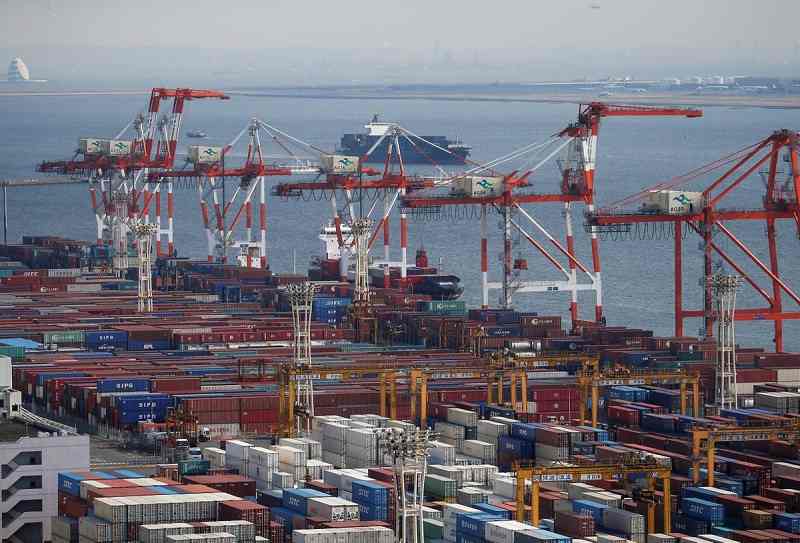
Shipping containers are seen at a port in Tokyo, Japan, March 22, 2017.
15:12 JST, November 17, 2022
Tokyo (Reuters) – Japan’s imports in October surged by more than half from a year earlier, dwarfing growth in exports and enlarging a trade deficit that has weighed heavily on the yen.
The trade gap is therefore worsening the pain felt by households struggling to make ends meet amid currency-driven price hikes of imported goodsand by import-reliant businesses facing difficulty in passing cost rises on to customers.
At 9.00 trillion yen, Japan’s exports in October were up 25.3% on a year before, led by shipments of cars, chips and electronics parts, according to government trade data. It was the 20th consecutive month to show annual export growth and followed a 28.9% gain seen in September.
Imports jumped 53.5% from a year before to 11.16 trillion yen in their 21st month of annual gains, driven by crude oil, coal and liquefied natural gas and resulting in a 2.16 trillion yen ($15.50 billion) trade deficit, a record for the month of October.
The September trade deficit was 2.09 trillion yen.
The world’s third-largest economy has depended on exports of processed goods such as cars and electronics for growth over the past few decades. Now Japan’s policymakers are concerned more about the impact of surging imports on its resource-poor economy, given the sharp yen declines.
“We expect Japan will continue to log a trade deficit going forward,” said Koya Miyamae, senior economist at SMBC Nikko Securities.
“The global economic slowdown could weaken the pace of export increases, while impacts from a weak yen and higher commodity prices on imports will continue.”
By destination, Thursday’s trade data showed U.S.-bound exports were 36.5% higher in October than a year before, driven by cars and motors.
Exports to China, Japan’s number-one trading partner, advanced 7.7% in October, led by cars and audio equipment. Annual growth in September had been 17.1%, however. The slowdown suggested China’s zero-COVID measures had weakened demand, affecting not only Japanese shipments but potentially the global economy, too.
Government data showed on Tuesday that Japan’s economy had shrunk in July-September for the first time in a year as imports outpaced exports, knocking off substantial portion of gross domestic product.
$1 = 139.3300 yen
Top Articles in Business
-

Prudential Life Insurance Plans to Fully Compensate for Damages Caused by Fraudulent Actions Without Waiting for Third-Party Committee Review
-

Narita Airport, Startup in Japan Demonstrate Machine to Compress Clothes for Tourists to Prevent People from Abandoning Suitcases
-

Japan, U.S. Name 3 Inaugural Investment Projects; Reached Agreement After Considerable Difficulty
-

Toyota Motor Group Firm to Sell Clean Energy Greenhouses for Strawberries
-

SoftBank Launches AI Service for Call Centers That Converts Harsh Customer Voices into Softer Voices
JN ACCESS RANKING
-

Japan PM Takaichi’s Cabinet Resigns en Masse
-

Japan Institute to Use Domestic Commercial Optical Lattice Clock to Set Japan Standard Time
-

Israeli Ambassador to Japan Speaks about Japan’s Role in the Reconstruction of Gaza
-

Man Infected with Measles Reportedly Dined at Restaurant in Tokyo Station
-

Videos Plagiarized, Reposted with False Subtitles Claiming ‘Ryukyu Belongs to China’; Anti-China False Information Also Posted in Japan




















